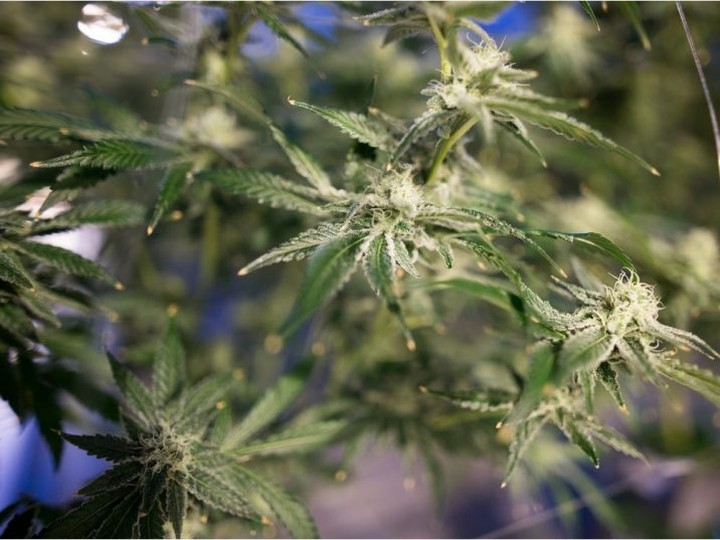many young americans with chronic pain turn to cannabis
doctor recommends young people wanting to manage their pain should instead start with non-drug treatments like massage therapy, yoga, physical therapy and exercise.

about two-thirds of respondents aged 18 to 34 reported experiencing chronic pain compared to 52 per cent of those 35 and older. /
witthaya prasongsin / istock / getty images plus
by: angela stelmakowicha recent u.s. survey showing that about a fifth of adults aged 18 to 34 are opting for cbd to treat their chronic pain has raised some alarm bells among doctors.dr. wayne jonas, executive director of integrative health programs at samueli foundation, acknowledges that cannabis and cbd have been shown to help ease pain related to various conditions, including cancer.still, “there’s insufficient evidence to support the effectiveness of cbd and cannabis in treating common chronic pain conditions,” dr. jonas reports in a statement from the samueli foundation, which strives to create societal value by investing in innovative, entrepreneurial and sustainable ideas.his comments follow findings from the harris poll, an online survey in september involving 2,000 u.s. adults that was commissioned by the foundation.the poll offered a few surprising, if not worrisome, results.about two-thirds of respondents aged 18 to 34 reported experiencing chronic pain compared to 52 per cent of those 35 and older; 73 per cent of the younger group with chronic pain said they experienced it every day; and 22 per cent of those under 35 with chronic pain use cannabis and/or cbd oil for pain compared to just 11 per cent of those aged 45 and older.the back, neck and knees were the most common sore spots for young adults with chronic pain, reported by 32 per cent, 20 per cent and 20 per cent of respondents in the under 35 age group.canadian figures released in 2018 by strainprint technologies ltd. found back pain, anxiety and arthritis were the top three reasons those over 50 used cannabis.“the prevalence of persistent pain among young adults is alarming, and their use of cannabis or cbd oil indicates they are seeking more ways to manage their pain through self-care,” dr. jonas says in a statement.in 2019, a group of new zealand physicians specializing in pain management expressed concern that the efficacy of cannabis in chronic pain treatment has been vastly overstated.
advertisement

earlier this year, australia’s leading pain advisory body recommended that doctors should not use medicinal cannabis to treat chronic pain. “do not prescribe currently available medicinal cannabis products to treat chronic non-cancer pain unless part of a registered clinical trial,” notes the recommendation posted on the health educational campaign, choosing wisely.and u.s. researchers concluded as part of a recent study that medical marijuana seems to show potential for pain, but could be associated with less self-care.of course, some investigators have determined that cannabis and cbd could prove useful for providing pain relief.two studies from mcmaster university in canada, published last month, suggest that medical cannabis may provide some relief for those living with chronic pain. and another canadian study released in early 2021 found that women reported more pain intensity than men and that opioid use was almost halved for those making it to the end of the research period.with the jury still out, dr. jonas recommends that rather than heading directly to cannabis or cbd, “young people should be working with their physicians to first try non-drug treatments that are recommended by the medical community, such as massage therapy, yoga, physical therapy and exercise.”some survey respondents are trying to do so. in all, 29 per cent of young adults with chronic pain reported that since the pandemic began, they have been talking to their doctors more often about their pain.

advertisement
that is nearly double the 15 per cent of those 45 and older who have done so.despite the increased discussion involving the younger age group, though, 75 per cent of young adults “also say they don’t know what kind of health care provider can best help them manage their pain.”that feeling seems to dovetail with a study out of vermont published last year. researchers found just 18 per cent of patients — who were seeking relief for conditions such as anxiety and depression, arthritis, pain, sleep and nausea — reported their provider was a good source of information regarding cannabis.“primary care providers, who manage most patients with pain, should steer their patients — especially young adults — to proven, effective strategies to manage their everyday pain,” dr. jonas maintains.the foundation reports that the most common approaches are over-the-counter pain relievers (53 per cent), followed by exercise (43 per cent), heat/ice (34 per cent), healthy eating (26 per cent), cannabis/cbd (16 per cent), physical therapy (15 per cent), massage therapy (15 per cent) and yoga (14 per cent).in all, 83 per cent of respondents experiencing chronic pain said their quality of life would greatly improve if they were better able to manage it and 68 per cent noted they wished they had more information about how to manage it.“it’s up to providers across the health care system to engage in regular conversations with patients to uncover the best ways to manage their pain on a daily basis,” dr. jonas said.
 4 minute read
4 minute read





